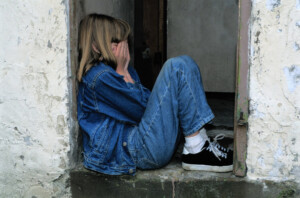 We don’t often think of social anxiety when it comes to children. Often, it seems like kids are quick to make friends and interact with others wherever they go.
We don’t often think of social anxiety when it comes to children. Often, it seems like kids are quick to make friends and interact with others wherever they go.
But, that isn’t always the case. Social anxiety disorders can impact children just as much as adults. It’s much more than just a fear of making friends or talking to other people. Rather, it’s likely your child is worried about being judged or talked about.
Anxiety focuses on a lot of “what ifs,” and social anxiety can have a person’s mind spinning with negative possibilities about social settings. But, when should you worry about it?
Maybe you think your child is just shy, or it’s a phase they’re going through. So, when should you start to step in and get them some help? Let’s take a closer look at the signs of social anxiety in kids.
What Are the Triggers of Social Anxiety Disorder in Children?
Again, social anxiety tends to stem from a fear of being judged by others. For kids, certain triggers might include speaking in front of peers, having to read out loud in class, or speaking with new people.
When you think about how many social settings kids have to face on a regular basis, it shouldn’t come as a surprise that those with social anxiety can be triggered easily. From interacting with classmates to playing a sport on a team, or even talking to adults at a family get-together, there are plenty of opportunities for social anxiety to take over your child’s thoughts.
How Social Anxiety Can Affect Kids
Not only does this kind of anxiety cause fear, but it can have a lasting impact on children struggling with it. Social anxiety can affect your child’s school performance, friendships, and self-confidence. They will be less likely to engage in group activities, including sports or other peer extracurriculars because they’re worried about being judged or embarrassed.
When Should You Be Concerned?
So, how can you tell if your child is struggling with social anxiety? When does it go past just being “shy” into something more serious?
When social anxiety starts to negatively impact your child’s quality of life, it’s time to do something. If they’re struggling at school, can’t seem to socialize with kids their age, or they’re showing signs of withdrawing into themselves, take action. Not sure what to look for when it comes to social anxiety? Some of the common symptoms in children include:
- Fear that arises without an actual threat
- Racing heart
- Nausea
- Sweating
- Trembling
- Fear that lasts more than six months
- Clinginess around familiar or “safe” people
- Dread of social events
If any of those symptoms sound familiar, your child might need some help overcoming their fears before they carry over into adulthood.
What Can You Do?
Thankfully, social anxiety in children is often easy to manage and treat. At home, you can work with your child on relaxation strategies like mindfulness, deep breathing, and guided imagery. You can also help them learn how to reshape their negative beliefs with cognitive reframing. Essentially, you’ll work with them on going through the worst-case scenario of a social situation. Doing so can help them feel more in control and prepared, essentially taking away a lot of the unknowns and the fear.
If your child is still struggling with social anxiety and you’re concerned about their well-being, don’t hesitate to reach out for professional help.
Therapy, even at a young age, can help someone get to the underlying cause of their anxiety. Once your child has a better idea of where the fear stems from, they can work with a therapist to overcome it and lead a more normal social life.
If you or your teen are looking for more support, Contact Us for information and how to get started with Teen Counseling or Play Therapy to help manage some of these impacts.
